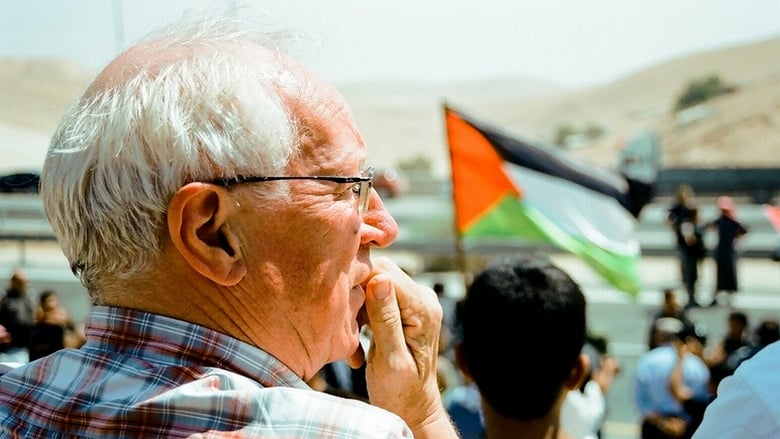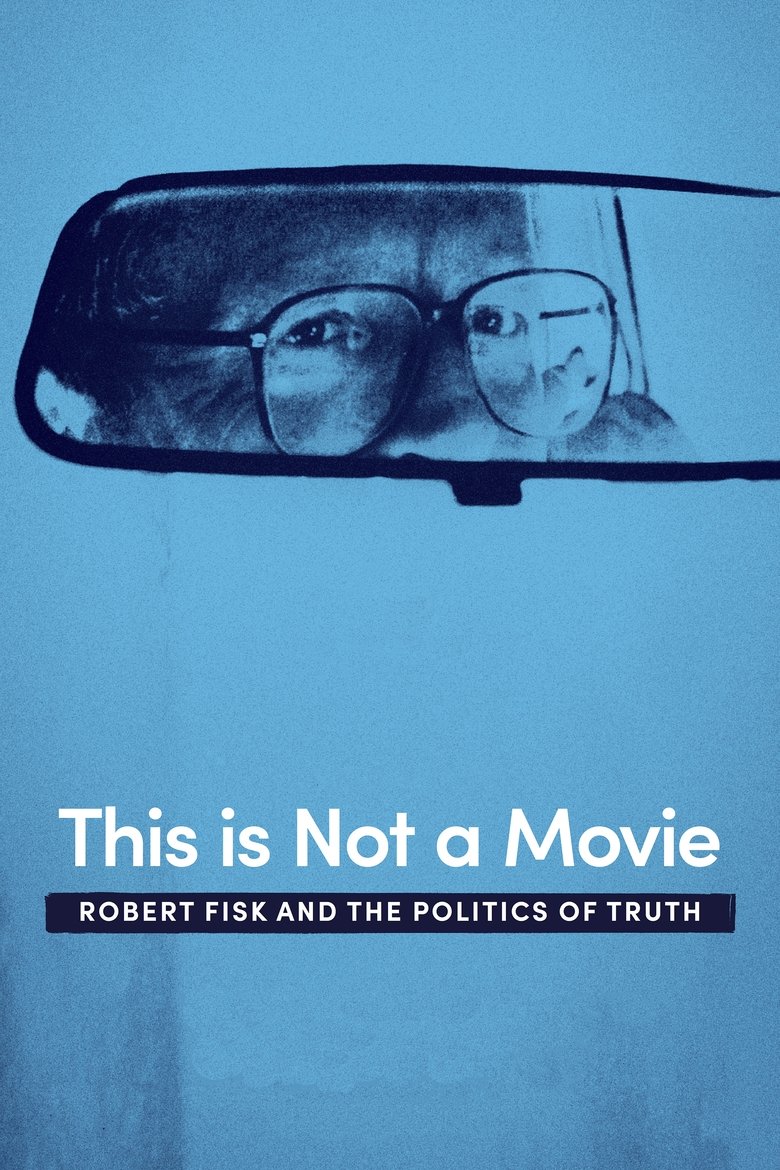

This Is Not a Movie: Robert Fisk and the Politics of Truth
Genres
Overview
For more than forty years, British journalist Robert Fisk has reported on some of the most violent conflicts in the world, from Northern Ireland to the Middle East, always with his feet on the ground and a notebook in hand, travelling into landscapes devastated by war, ferreting out the facts and sending reports to the media he works for with the ambition of catching the interest of an audience of millions.
Details
Budget
$0
Revenue
$0
Runtime
109 min
Release Date
2019-09-06
Status
Released
Original Language
English
Vote Count
6
Vote Average
7.5
Robert Fisk
Self - Narrator / Journalist
Jihad Sultan
Self - Military General
Tim Eddy
Self - History Professor
Antranik Helvadjian
Self - Bookstore Owner
Suheil Natour
Self - Palestinian Official
Nirmeen Hazineh
Self - Palestinian Woman
Tsoleen Sarian
Self - Archivist
Finian Everard
Self - Military Lieutenant
Vesna Almo
Self - Serbian Fixer
Ifet Krnjić
Self - Retired Weapons Seller
Adis Ikanović
Self - Factory Managing Director
Amira Solh
Self - Urban Planner
Amer Mrayati
Self
Lamiaa Al Saad
Self
Amira Hass
Self - Israeli Journalist
Antony Loewenstein
Self - Freelance Journalist
Chaim Silberstein
Self - Israeli Settler
Sulieman Khatib
Self - Palestinian Man
Alan Dershowitz
Self - Lawyer (voice)
William Fisk
Self - Fisk's Father (archive footage)
Osama bin Laden
Self - Al-Qaeda Leader (archive footage)
0.0
The Guide for the Perplexed
Director Yigal Bursztyn’s made-for-TV road movie takes viewers on a contemporary journey in which he traces the gospel and teachings of Jewish philosopher, Maimonides (aka the Rambam). Burszstyn goes from the Spanish city of Cordoba to Fes in Morocco, then onwards to Egypt and finally, Israel. In the course of this physical, geographical journey, Bursztyn also does a deep dive into Maimonides’s 12th century canonical work, The Guide for the Perplexed, which he uses as a tool to interpret present-day events and the conflicts between faith and rationale, and between religion, culture, and gender.
2006-03-31 | he
7.2
Hunger
The story of Bobby Sands, the IRA member who led the 1981 hunger strike during The Troubles in which Irish Republican prisoners tried to win political status.
2008-05-15 | en
5.0
The Matchmaker
A unique interview with Tooba Gondal, the woman who groomed and lured scores of Western women to join ISIS. Using social media, she became a deadly matchmaker, recruiting a number of high-profile “jihadi brides” for ISIS militants in Syria: she allegedly helped organise the transporting of three British schoolgirls, including Shamima Begum, to Syria.
2022-08-31 | en
8.0
Dogs of War
The untold true story of how Dave Tomkins, originally a safe-cracker from London, rose from small-time criminal to international mercenary and arms dealer, enabling death and destruction around the world.
2024-10-20 | en
8.0
Jerusalem Cuts
One war, ten days, three stories: the Old City of Jerusalem, at the dawn of a new Middle East. For the Brits, it’s the shameful end of 30 years Mandate. For the Jews, it’s the birthday of their State. And for the Palestinians, it’s a catastrophe. Only now, 60 years later, images can be shown from three opposing points of view, telling a whole new story.
2008-04-01 | en
5.7
I Want to See
July 2006. Another war breaks out in Lebanon. The directors decide to follow a movie star, Catherine Deneuve and a friend, actor and artist Rabih Mroue;, on the roads of South Lebanon. Together, they will drive through the regions devastated by the conflict. It is the beginning of an unpredictable, unexpected adventure...
2008-05-16 | fr
10.0
Leopard Skin
Some 40 years after setting foot in Israel for the first time, journalist Pierre Nadeau felt the desire to return there to take stock of the Israeli-Palestinian conflict.
2006-12-04 | fr
7.0
The Human Factor
How US politicians and diplomats, over the past 25 years, have come close to achieving something almost impossible: securing peace between the State of Israel and its Arab and like-minded neighbors, mired in a struggle both dialectical and violent since the early 20th century, due to historical and religious reasons, entrenched offenses and prejudices, and the invisible and tyrannical hand of third countries' geopolitical interests in the area.
2021-05-07 | en
7.7
Waltz with Bashir
An Israeli film director interviews fellow veterans of the 1982 invasion of Lebanon to reconstruct his own memories of his term of service in that conflict.
2008-06-12 | he
6.7
Katyn
On September 1st, 1939, Nazi Germany invades Poland, unleashing World War II. On September 17th, the Soviet Red Army crosses the border. The Polish army, unable to fight on two fronts, is defeated. Thousands of Polish men, both military and government officials, are captured by the invaders. Their fate will only be known several years later.
2007-09-21 | pl
7.1
Retrograde
The story of the last months of the 20-year war in Afghanistan through the intimate relationship between American Green Berets and the Afghan officers they trained.
2022-10-17 | en
7.5
Control Room
A chronicle which provides a rare window into the international perception of the Iraq War, courtesy of Al Jazeera, the Arab world's most popular news outlet. Roundly criticized by Cabinet members and Pentagon officials for reporting with a pro-Iraqi bias, and strongly condemned for frequently airing civilian causalities as well as footage of American POWs, the station has revealed (and continues to show the world) everything about the Iraq War that the Bush administration did not want it to see.
2004-01-15 | ar
4.8
Intent to Destroy: Death, Denial & Depiction
INTENT TO DESTROY embeds with a historic feature production as a springboard to explore the violent history of the Armenian Genocide and legacy of Turkish suppression and denial over the past century.
2017-11-10 | en
6.1
The Lark Farm
The Lark Farm is set in a small Turkish town in 1915. It deals with the genocide of Armenians, looking closely at the fortunes, or rather, misfortunes of one wealthy Armenian family.
2007-05-04 | it
6.0
Bones of Contention
A history of the political and social repression carried out by the ruthless regime of Spanish dictator Francisco Franco between 1936 and 1975 that focuses on the lives of gays and lesbians during those dark years and the death of the Spanish gay poet Federico García Lorca.
2018-03-02 | en
7.7
1970
Poland, 1970. When popular protests erupt in the streets due to rising prices, the communist government organizes a crisis team. Soon after, the police use their truncheons and then their firearms. The story of a rebellion from the point of view of the oppressors.
2021-12-10 | pl
7.8
Coup 53
Tehran, Iran, August 19, 1953. A group of Iranian conspirators who, with the approval of the deposed tyrant Mohammad Reza Pahlavi, have conspired with agents of the British MI6 and the US CIA, manage to put an end to the democratic government led by Mohammad Mosaddegh, a dramatic event that will begin the tragic era of coups d'état that, orchestrated by the CIA, will take place, over the following decades, in dozens of countries around the world.
2019-09-01 | en
7.3
Goering's Catalogue: A Collection of Art and Blood
For more than a decade, Reichsmarschall Hermann Goering, Adolf Hitler's right-hand man during the infamous Third Reich, assembled a collection of thousands of works of art that were meticulously catalogued.
2021-03-14 | fr
0.0
50 Years of the Troubles: A Journey Through Film
The film marks 50 years since riots erupted across Northern Ireland, widely seen as the beginning of the thirty-year conflict known as The Troubles. Mark Cousins – who left Belfast at 18 – returns to his hometown to reflect on how the place and its history have been used and occasionally abused by cinema. He traces how the legacy of division has impacted on the nation’s cinematic imagination; and, in a city that once had one of the highest rates of movie-going in the UK, he scrambles around the ruins of Belfast’s once-grand cinemas.
2019-09-01 | en
0.0
Discordia
In the fall of 2002, it was announced that Benjamin Netanyahu would deliver a speech at Concordia University in Montreal, and reaction from the student body was swift and sudden.
2004-02-02 | en